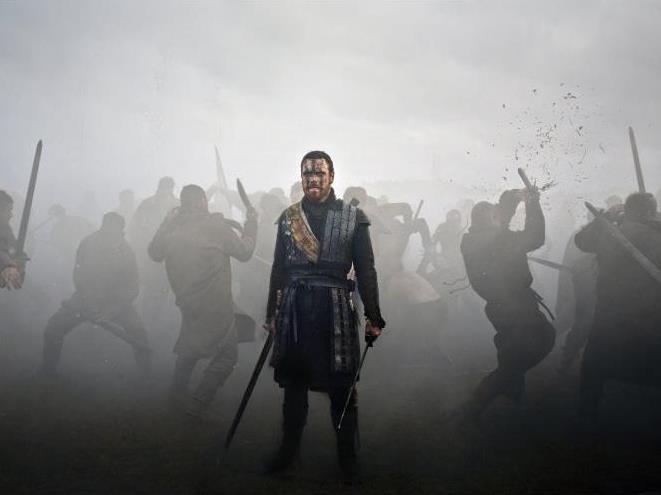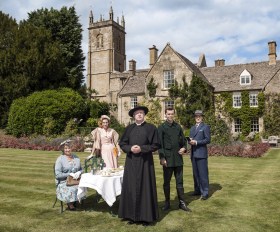In bringing the latest version of William Shakespeare’s Scottish play to cinema screens, director Justin Kurzel (Snowtown) sees red. The film’s on-screen text, title and bookending shots bear the hue, as do many of the glowing skies under which its tense, terse toil and trouble takes place. Such flourishes are merely the visual manifestations of the filmmaker’s fondness for the colour; Kurzel sees red literally, in splashes here and spurts of blood there, but he also spies it in idiomatic form. His feature is shaded by the anger and pain that simmers within a warrior springing from the brutality of battle and grief to take power, in a mourning woman using her ire at her fate to embolden her beloved, and in the reaction to their murderous reign of ambition and endurance from those around them.
It fits, then, that Macbeth‘s titular character (Michael Fassbender, Slow West) and accompanying lady (Marion Cotillard, Two Days, One Night) keenly consume the cloud of crimson swirling in front of their eyes — until, of course, it consumes them. As the Bard of Avon’s 400-year-old tragedy tells, the former is a fearsome and victorious general in the army of King Duncan (David Thewlis, The Theory of Everything) in 11th century Scotland, while the latter is his supportive wife. As screenwriters Michael Lesslie (short Skirt), Jacob Koskoff and Todd Louiso (co-scribes of The Marc Pease Experience) refashion, the duo is introduced mourning the death of their only offspring, their woe evident.
Their loss, as well as the prophetic words of witches whispered across foggy moors and then weaselling their way into fragile minds, sparks the desire to avoid more sorrow by seizing the moment and instilling Macbeth as the country’s new leader. When his rule is met by increasing suspicion, the married couple’s feelings of both shame and self-preservation are amplified. Friends — fellow general Banquo (Paddy Considine, Pride) and fellow leader Macduff (Sean Harris, Serena) among them — come to be regarded foes, as does any source of opposition.
The feature’s many rage- and ache-fuelled clashes, between disagreeing parties as much as divergent sentiments fighting for supremacy within characters, thunder forth in what becomes a simultaneously striking yet sparse iteration of the classic text. Kurzel builds upon the moody, brooding menace of his chilling serial killer debut, once again establishing his style as his strength; however his masterful aesthetic touch does not suffer from, nor struggle with, having to adapt and ingeniously reinvent portions of an iconic effort. With cinematographer Adam Arkapaw (TV’s Top of the Lake), he creates texture within visuals shot wide for context and close for emotion, and painted with the contrast of bleakness and brightness that seethes within the content. With editor Chris Dickens (The Double), he revels in juxtaposing bursts of conflict with stillness, heightening one in the other and vice versa. With composer Jed Kurzel (Son of a Gun), he layers a haunting, humming, bass-heavy soundscape upon images designed to distress and evoke despair.
Such meticulous, mesmerising, magnetic artistry, reworking the familiar and leaving it feeling fresh, fiery, fierce and even feverish, make Macbeth stand out even beyond the populated pool of equivalent stage-to-cinema leaps — Orson Welles and Roman Polanski’s offerings of the same name, and Akira Kurosawa’s Japanese-set Throne of Blood included. Severity and savagery slices through every frame and line, lingering long beyond the moment chaos is seen and cruelty heard, as oft posed and uttered in the inhospitable outdoors in keeping with medieval western atmosphere the film conjures. A bold and uncompromising feature results, canvassing the impact of desire in an environment rife with death, which hardly surprises; that an immersive sensory experience does as well is a similarly anticipated conclusion. The immediate, urgent knowledge that movie will leave a blistering impression is also accompanied by another observation obvious from the outset: the stellar performances of the two leads.
Each adding yet another jewel to crowns increasingly shiny and abundant with such charms, Fassbender and Cotillard express the potency and passion trapped within figures doomed to be anguished by all that has come before, and all that will come to pass. His protagonist is physically imposing yet mentally fraying; her Lady Macbeth is equally composed yet delicate; together, they sink into heartache and spit venom while showing empathy far beyond that normally afforded the characters. To praise their turns — as most vigorously showcased in monologue form — is not to downplay the comparably complex work of their supports, particularly by the more subdued Considine and the simmering Harris, with Jack Reynor (A Royal Night Out) and Elizabeth Debicki (Everest) also making the most of pivotal parts with limited screen time. Instead, to praise Macbeth‘s stars is to recognise that the stripped-back feature’s fortunes are as intertwined with their convincing efforts as with Kurzel’s commanding cultivation of sound and fury. Combined, as cast in red-soaked shadows and pumping with blood, they signify everything.
Rating: 5 stars out of 5
Macbeth
Director: Justin Kurzel
UK / USA / France, 2015, 113 mins
Release date: 1 October
Distributor: Transmission
Rated: MA
Actors:
Director:
Format:
Country:
Release:





